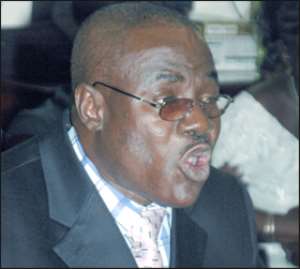
Dr Oteng Adjei - Energy Minister A fuel shortage has hit the nation's capital Accra, compelling motorists, both commercial and private, to scout for the essential commodity from stations dotting the city.
Taxi drivers, unable to contain the stress associated with the shortage, have expressed uncomplimentary remarks about the managers of the economy, with some saying they cannot recall the last time they witnessed fuel shortage in the country.
The fuel shortage, which was noticed Saturday evening, appears to be gradually creeping across the city, making observers wonder what would happen if long queues begin to feature at filling stations.
There was “panic buying” early morning yesterday with long queues forming in some parts of the city where DAILY GUIDE visited.
DAILY GUIDE gathered that petrol had run out of stock with diesel also unavailable at Total and Shell filling stations.
Some motorists who spoke to this paper complained about what according to them, is the shortcoming of the downward review of petroleum prices by the government. Fuel prices had remained the same when some taxes on petroleum products were removed early this month.
It is even unclear at the time of going to press whether the issue had been resolved, as checks by DAILY GUIDE at the Tema Oil Refinery indicated that there was some shortage of fuel at the refinery.
At the Total filling station in Adabraka, the Shell filling station at Ridge and other places in the capital city, there was neither petrol nor diesel. No explanations were given for the shortage by the attendants at the stations when the paper inquired.
A taxi driver, Inusah Alhassan, who was angry at the development, expressed dissatisfaction, adding that less than three months since the National Democratic Congress (NDC) government assumed office, everything had been getting out of hand.
Another “trotro” driver, Jerry Ansah, also expressed worry over the situation.
Also, he cited the depreciation of the cedi and blamed the government for the development.
“They deceived us into thinking they are going to put money in our pockets; and so we voted them into office and now look at what is happening.
“How can the Ghana Cedi depreciate so rapidly against the US Dollar, selling at GH¢1.4? Someone was able to keep the cedi below GH¢1 for a long period of time, so why can't they solve this?” the bemused driver queried.
Nii Amponsah, a resident of Accra, blamed the government for reducing taxes on some petroleum products, adding, “You lose GH¢50 million every month for no apparent reason because you want to fulfill political promises and score political points.”
A banker, who also spoke to this paper, blamed the government for giving so much attention to ex-gratia issues among others instead of tackling the economy which is under the heat of the global financial crisis.
Parliament, this month amended two petroleum bills, the Customs and Excise (Petroleum Taxes and Petroleum Related Levies) Bill, 2009 and the Debt Recovery (Tema Oil Refinery Company) Fund Bill, 2009 so as to allow for the reduction in fuel prices.
In this regard, the National Petroleum Authority (NPA) announced new prices of fuel products ranging from 3 to 10 percent in line with the reduction in the petroleum taxes.
At the time petroleum products were reviewed, oil was selling at $40 per barrel but has climbed back to $50 with speculations that the important commodity may go further up due to expected cuts by the oil producing cartel, OPEC.
By Charles Nixon Yeboah




 Former Kotoko Player George Asare elected SRC President at PUG Law Faculty
Former Kotoko Player George Asare elected SRC President at PUG Law Faculty
 2024 elections: Consider ‘dumsor’ when casting your votes; NPP deserves less — P...
2024 elections: Consider ‘dumsor’ when casting your votes; NPP deserves less — P...
 You have no grounds to call Mahama incompetent; you’ve failed — Prof. Marfo blas...
You have no grounds to call Mahama incompetent; you’ve failed — Prof. Marfo blas...
 2024 elections: NPP creates better policies for people like us; we’ll vote for B...
2024 elections: NPP creates better policies for people like us; we’ll vote for B...
 Don’t exchange your life for wealth; a sparkle of fire can be your end — Gender ...
Don’t exchange your life for wealth; a sparkle of fire can be your end — Gender ...
 Ghana’s newly installed Poland train reportedly involved in accident while on a ...
Ghana’s newly installed Poland train reportedly involved in accident while on a ...
 Chieftaincy disputes: Government imposes 4pm to 7am curfew on Sampa township
Chieftaincy disputes: Government imposes 4pm to 7am curfew on Sampa township
 Franklin Cudjoe fumes at unaccountable wasteful executive living large at the ex...
Franklin Cudjoe fumes at unaccountable wasteful executive living large at the ex...
 I'll 'stoop too low' for votes; I'm never moved by your propaganda — Oquaye Jnr ...
I'll 'stoop too low' for votes; I'm never moved by your propaganda — Oquaye Jnr ...
 Kumasi Thermal Plant commissioning: I pray God opens the eyes of leaders who don...
Kumasi Thermal Plant commissioning: I pray God opens the eyes of leaders who don...
